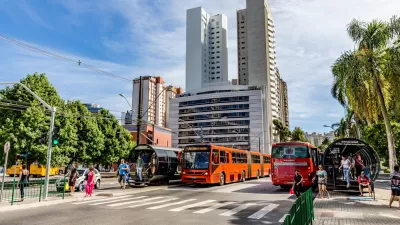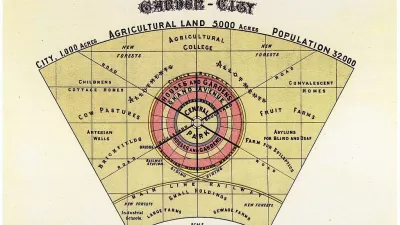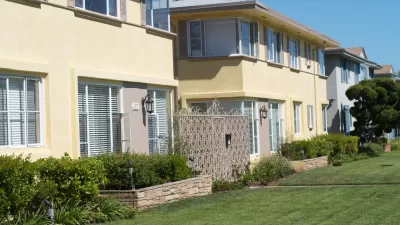England's plans to build 3 million new homes by 2020, and much emphasis has been placed on making them environmentally friendly. The push for "eco-town" draw a strong parallel to the "Garden Cities" of the past.
"Yesterday's response to the announcement of 15 proposed eco-towns was similarly grudging. But if we must build to meet the Government's target of 3 million new homes by 2020, then these zero-carbon settlements seem as good a scheme as any. What's more, after the wrong turn of the New Towns and edge estates of the postwar years, the eco-towns herald a return to the purity of the Garden City template."
"Only in the tiny hamlet of Letchworth, among the gentle hills of Hertfordshire, was the scheme ever properly attempted. Under Howard's oversight, architects Barry Parker and Raymond Unwin set to work building a Garden City designed to embody more than the "mere self-centred independence and churlish disregard of others, which have stamped their character on our modern towns". For here was the guiding ambition: through design and architecture the garden cities, like the eco-towns, would foster a new approach to society and nature. Today, the challenge is climate change; then, a fear of humanity losing its spiritual and social bearings as it was steadily detached from the soil."
"So far the signs are that the Government has learnt from the worst mistakes of the New Towns experiment and, with their demand for each site to have a "separate and distinct" identity, is rightly seeking to avoid the McMansion sprawl so favoured by property developers. Of course, there remain sites in the long list that should be aborted: building on open countryside around Pennbury is ill-advised given the amount of regeneration that is needed in run-down Leicester, only four miles away. While the developments in Bedfordshire, Nottinghamshire and South Yorkshire all threaten Greenbelt land."
FULL STORY: Can eco-towns stop the sprawling suburbs?

Alabama: Trump Terminates Settlements for Black Communities Harmed By Raw Sewage
Trump deemed the landmark civil rights agreement “illegal DEI and environmental justice policy.”

Planetizen Federal Action Tracker
A weekly monitor of how Trump’s orders and actions are impacting planners and planning in America.

Why Should We Subsidize Public Transportation?
Many public transit agencies face financial stress due to rising costs, declining fare revenue, and declining subsidies. Transit advocates must provide a strong business case for increasing public transit funding.

Understanding Road Diets
An explainer from Momentum highlights the advantages of reducing vehicle lanes in favor of more bike, transit, and pedestrian infrastructure.

New California Law Regulates Warehouse Pollution
A new law tightens building and emissions regulations for large distribution warehouses to mitigate air pollution and traffic in surrounding communities.

Phoenix Announces Opening Date for Light Rail Extension
The South Central extension will connect South Phoenix to downtown and other major hubs starting on June 7.
Urban Design for Planners 1: Software Tools
This six-course series explores essential urban design concepts using open source software and equips planners with the tools they need to participate fully in the urban design process.
Planning for Universal Design
Learn the tools for implementing Universal Design in planning regulations.
Caltrans
Smith Gee Studio
Institute for Housing and Urban Development Studies (IHS)
City of Grandview
Harvard GSD Executive Education
Toledo-Lucas County Plan Commissions
Salt Lake City
NYU Wagner Graduate School of Public Service





























